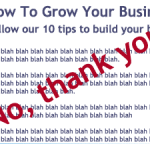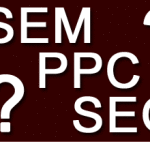Knowing what keywords to optimise for
Is your website optimised for search engines? That’s great. The big question, however, is which keyword phrases your pages are optimised for – and do people actually type those terms into search engines?
Many websites naturally rank well for their own business name, brand or product names. Unless your branded names are incredibly common, it’s not hard at all to rank well for these, particularly if the words are part of your domain name or page URLs.
It’s the more generic keyword phrases your target market may be using that you want to know about, so you can optimise your pages for them and get new people (potential customers) who don’t yet know about you to find your website. You want to find the search terms people use when looking for the type of products/services you offer and target those.
Google’s free Keyword Tool is mainly intended for finding good keywords to bid on in AdWords, but is also incredibly useful for uncovering effective organic keywords to optimise your pages for. [Update:] You now need to sign into your AdWords account to use the tool, or register an account if you don’t have one. It’s quick and easy, and millions of people use their account only for the keyword tool without buying ads.
When using the Google Keyword Tool, remember to select the country (and language, if not English) you want to see results for, e.g. Australia. Use it to find keyword ideas or get an idea of the popularity of a particular search term. Try typing a number of keyword variations and combinations in the search box to get different keyword ideas.
Although the numbers you see aren’t all that accurate, they do give you a good idea of which terms are much more popular than others, or find out if the phrases you had in mind don’t get searched for at all – before you spend (waste) time optimising your pages for them.
You should also check out the competition for any phrase you want to use. If 10 million web pages are optimised for that same phrase already, there’s absolutely no use trying to get on page 1 of Google for it – unless you’re willing to spend gazillions of dollars and hire a dedicated SEO to try to get you there over time. It’s more effective to optimise for search phrases that are less competitive (often a bit more specific) so they are more achievable.
I offer keyword research as part of my web copywriting services. Writing web content without knowing what sort of search terms the target market might use to find that kind of information is a waste of a good opportunity to get found online by new potential customers.
A project I recently completed involved keyword research and rewriting/optimising existing copy for a Wooli accommodation provider. They ranked well for their business name but not that well for a range of other search phrases used by their target market.
By optimising other pages on the site for different phrases, we’re trying to get people who are not yet specifically looking for Wooli holiday accommodation to eventually find the website as well, for example if they are searching for weekend escapes NSW and some other terms.
The great thing about keyword research in SEO is that you can uncover excellent opportunities in search terms you might not have considered and to maximise the ‘findability’ of web pages by your target audience. Or at the very least – to get confirmation (or otherwise) that the search terms you were thinking of optimising a page for are indeed logical.
If you need help with your SEO, for instance keyword research and editing/optimising your web pages, feel free to get in touch and ask for a quote. I would be happy to help you.
Micky Stuivenberg of Triple W Communications (trading online as Content Writer) is an experienced Web Copywriter and SEO Consultant.


------------------------------
Comments are closed.